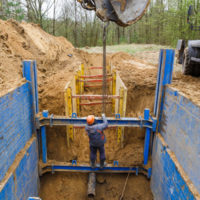Trench Worker Dies in Equipment Accident
July 2, 2019 Trenching and excavation work is highly dangerous, and just this month a 33-year-old Texas construction worker died after a backhoe slid into the trench where he was working. Most trenching and excavation accidents are preventable, but because the nature of the work is so dangerous there are fatal consequences when general contractors or employers fail to protect workers.
Trenching and excavation work is highly dangerous, and just this month a 33-year-old Texas construction worker died after a backhoe slid into the trench where he was working. Most trenching and excavation accidents are preventable, but because the nature of the work is so dangerous there are fatal consequences when general contractors or employers fail to protect workers.
Trenching and excavation data: hazards, injuries, and deaths
According to the Occupational Safety and Health Administration, or OSHA, the fatality rate for trench work is 112% higher than the rate for the general construction industry. For example, this year the agency had to investigate 5 different trenching deaths that occurred in less than 10 days. Dozens of trench and excavation workers die every year, and hundreds more are injured.
There are numerous hazards associated with trenching and excavation work. Some of the most dangerous and common ones are:
- Cave-ins;
- Inhalation of toxic fumes;
- Drowning;
- Electrocution or explosion when workers encounter underground electric utilities, and:
- Asphyxiation due to lack of oxygen in confined spaces
OSHA not only requires general contractors and employers to protect their workers but also creates health and safety programs that directly address known hazards. The agency says the following safety failures are responsible for causing the majority of trenching and excavation injuries and deaths:
- Failure to inspect trench and protective systems. OSHA calls trenching and excavation sites “hazardous because they are inherently unstable”. Without inspecting a site daily and not only providing protective systems but also ensuring that they are safe and effective, workers lives are endangered – and it is illegal for employers to do.
- No protective systems in place. A trench protective system can be anything from contacting a utility company to find out where underground lines are located, to providing safe access in and out of the excavation site.
- Unsafe spoil-pile placement. “Spoils” are any excavated trenching materials, and they are hazardous when they are set too closely to the edge of the site (this appears to be how the 33-year-old construction worker was killed: a backhoe slid off the edge of the site and onto him). Ensuring that spoils are a minimum of 2 feet from the excavation and using other safety devices is critical.
- Unsafe access/egress. This means when there is the failure to have ladders, stairways, or ramps that help avoid deadly fall injuries when entering or exiting the excavation.
Filing anonymous safety and health complaints with OSHA
Without safety controls in place, trenching and excavation workers get seriously hurt and die. Far too often general contractors and employers fail to obey federal regulations and compromise worker health and safety. Reporting safety violations (which can be done anonymously) is one way to protect and save lives.
Negligent general contractors or employers should not be allowed to get away with willful violations that result in the loss of life or permanently disabling injuries to workers – but they often do, which means hardworking men and women go to work every day on noncompliant, extremely dangerous jobsites. If you need to speak with an attorney about a trenching and excavation accident stemming from an irresponsible employer and unsafe job conditions, contact a representative at our firm who can help.
Philadelphia Workers’ Compensation / Construction Accident Lawyers at Galfand Berger, LLP Represent Individuals Injured at Work
If you were injured at work, please contact our Philadelphia Workers’ Compensation and construction accident lawyers at Galfand Berger. With offices located in Philadelphia, Bethlehem, Lancaster, and Reading we serve clients throughout Pennsylvania and New Jersey. To schedule a consultation, call us at 800-222-8792 or complete our online contact form.
 Google Screened
Google Screened
